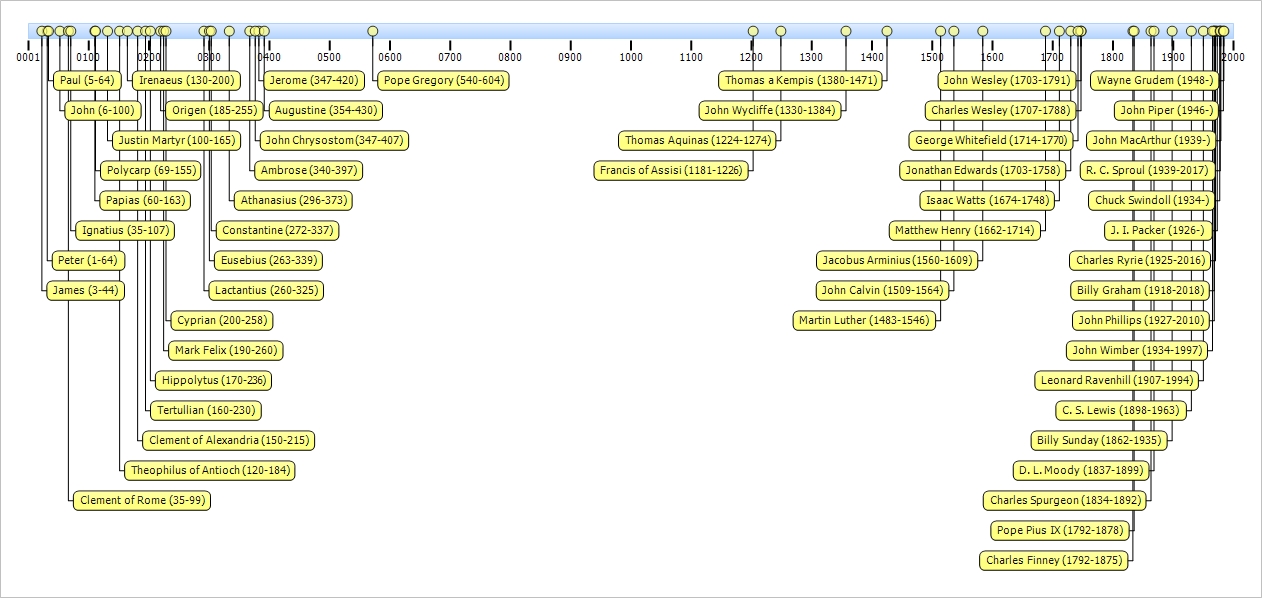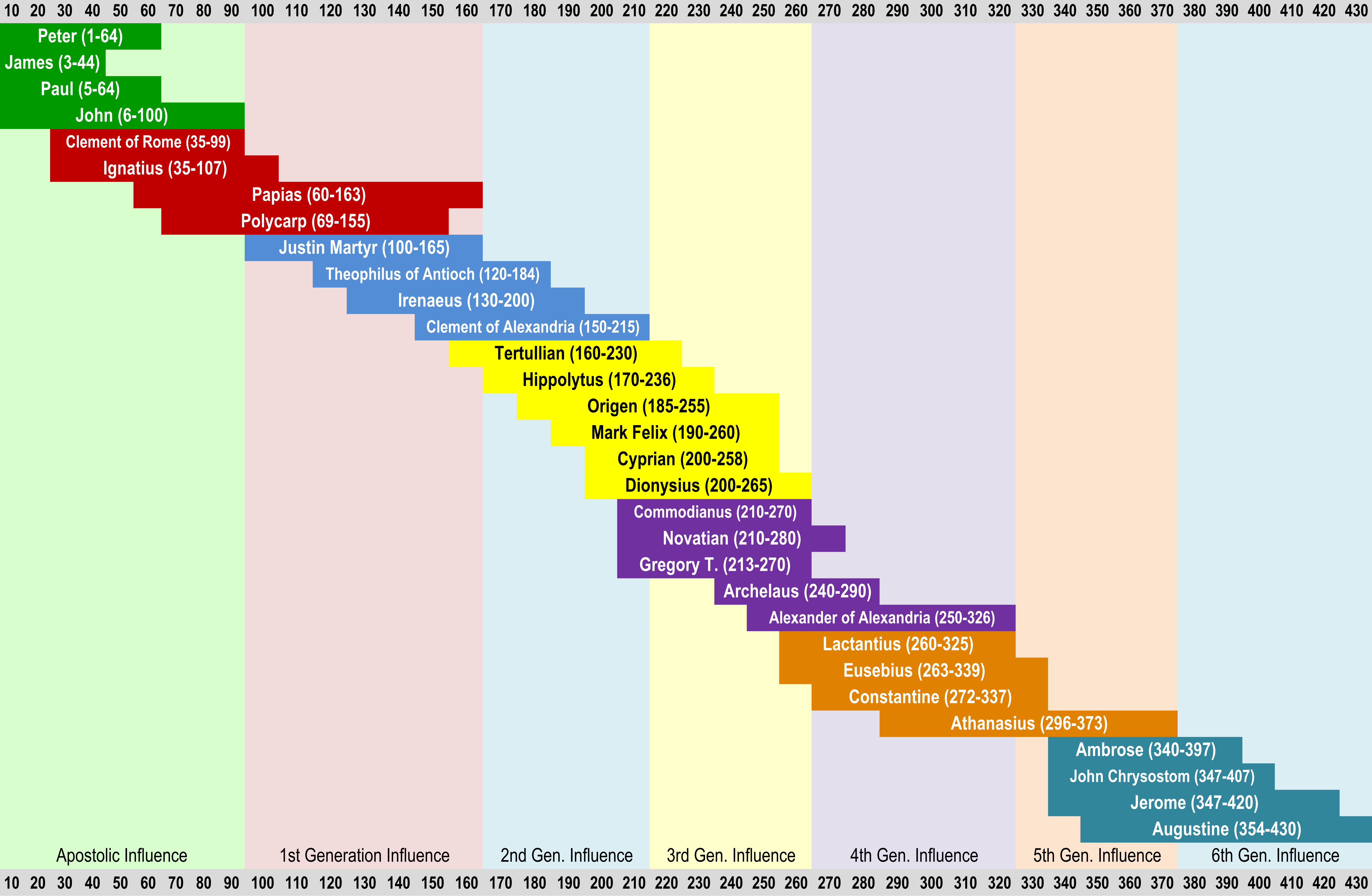
Timeline of Christian Leaders
Timeline of Christian Leaders
Much of the Bible doctrine taught in today’s churches does not come from the Bible itself. Rather, it comes from theologians who have written extensively about what they believe the Bible says. The past several hundred years have seen a marked increase in the number of commentaries and other reference works being written, as theologians from all denominations try to explain the Bible in ways that support their doctrine. In contrast, Christians from the first few centuries after Christ understood the Bible to mean exactly what it said, and they lived their lives accordingly. These early Christians had significant advantages that we lack today, yet they are largely unknown in today’s churches.
Despite many boldly proclaimed statements to the contrary, much of the Bible doctrine taught in today’s churches does not come from the Bible itself. Rather, it comes from theologians who have written extensively about what they believe the Bible says. Have you ever heard of Clement of Rome, Ignatius, Polycarp, Justin Martyr, Irenaeus, Clement of Alexandria, Tertullian, Origen, or Cyprian? If not, why not? Is it because their beliefs differ from the Bible or because their beliefs differ from our modern interpretation of the Bible as seen through the lens of other theologians?
Refer to the following timeline of Christian writers, stretching from the apostles Peter, James, John, and Paul to the present. Notice that there are clusters of people during the first few centuries and also during the last few centuries. One might think that the main reason we don’t hear more from the people who lived nearer to the time of Jesus and the apostles is that their writings were not preserved. However, the evidence indicates otherwise. Some of the early Christian leaders were prodigious writers and their writings have been well preserved to this day. The writings of the early Christians up to AD 325 are available in the Ante-Nicene Fathers, a 10-volume set published in 1885. This resource is available in book form, PDF, or via the internet.

Click on the timeline to zoom in.
The following timeline shows the time period from Martin Luther to the present. Because of the Protestant Reformation, it is quite common to hear the names of Martin Luther and John Calvin in evangelistic circles. However, these two men lived nearly 1500 years after Jesus and the apostles. Many pastors today quote from popular study Bibles and commentaries, most of which were written or compiled in the 20th century. Modern preachers have been heavily influenced by pastors and writers such as Charles Spurgeon, D. L. Moody, C. S. Lewis, John MacArthur, John Piper, and many others. These are 18th, 19th, and 20th, and 21st century influences. Why don’t we hear much, if anything, about the early Christians, what they believed, and how they lived?

Click on the timeline to zoom in.
Refer to the following timeline, showing the major figures in the early church through Augustine’s death in 430, and their relationship in time to each other. Note that many of their lives overlapped, and each generation influenced the next. What advantages would people like Clement of Rome, Ignatius, Papias, and Polycarp have had? They lived at the same time as some of the apostles and often learned directly from them! For example, Ignatius, Papias, and Polycarp were disciples of John; and Clement of Rome likely learned from Peter and Paul.

Click on the timeline to zoom in.
The early Christians also had the distinct advantage of being able to learn from the oral tradition that was passed down (John 21:25). They could have asked questions about any subject that was in doubt, and they could have consulted the bishops and church leaders who were appointed directly by the apostles. In all cases, these early Christians were MUCH closer in time to the original teachings of Jesus and the apostles than are contemporary theologians; yet the modern church rarely discusses them. The average Christian has difficulty pronouncing their names, much less knowing what they believed. Why is there such ignorance in the modern church about these heroes of the faith? Perhaps it is because the early Christians believed and lived something very different from what we believe and live today.
- “And let those who are not found living as He taught, be understood to be no Christians, even though they profess with the lip the precepts of Christ; for not those who make profession, but those who do the works, shall be saved, according to His word: ‘Not everyone who says to me, “Lord, Lord,” will enter the kingdom of heaven, but the one who does the will of my Father who is in heaven.’” – Justin Martyr (c. 160)
- “We do not teach concerning the unrighteous man that it is sufficient for him to humble himself on account of his wickedness. Rather, God will accept him only if – after passing condemnation upon himself for his past conduct – he walks humbly on account of it and in a righteous manner for his remaining days.” – Origen (c. 248)
- “Some think that God is under a necessity of bestowing even on the unworthy what He has promised to give. So they turn His liberality into His slavery. . . . For do not many afterwards fall out of grace? Is not this gift taken away from many? These, no doubt, are they who, . . . after approaching to the faith of repentance, build on the sands a house doomed to ruin.” – Tertullian (c. 203)
- “The soul that . . . is neither holy nor blameless because of wickedness . . . is not part of the church that Christ builds upon the rock. But if anyone wishes to embarrass us in regard to these things because of the great majority of those of the church who are thought to believe, it must be said to him that ‘many are called, but few chosen.’ . . . ‘Many, I say unto you, will seek to enter in and will not be able.’ You will understand that this refers to those who boast that they are of the church, but who live weakly and contrary to the Word.” – Origen (c. 225)
- “If anyone follows unrighteousness and does those things that are contrary to the will of God, such a person will be considered by God the same as the disobedient unbeliever.” – Apostolic Constitutions (compiled c. 390)
Is it any wonder that our churches are full and our world is empty? Christians aren’t being told that they need to live out the Christian life, and they aren’t taught what that means in real-world practical terms. How many absolutely impractical sermons must be preached before we realize that a sermon without practical applications is an absolute waste of time? Many sermons today appear to be crafted solely to reassure people of their salvation, no matter how they act in their daily lives. There is little effort to teach and train people in the basics of living out their faith. Instead, the emphasis is on saying the salvation prayer once in your life, attending church, and tithing. Such a message would be absolutely foreign to the apostles and early Christians. According to them, the essence of Christianity is not spending an hour a week at church and being assured of your salvation. The essence of Christianity is a changed life! “We are philosophers – not in words – but in deeds,” Cyprian wrote. “We do not speak great things; we live them.”
